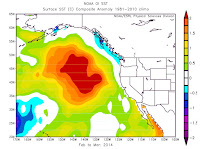Deep in the northeast Pacific Ocean, The Blob is acting strangely.
When the abnormally warm patch of water first appeared in 2013, fascinated scientists watched disrupted weather patterns, from drought in California to almost snowless winters in Alaska and record cold winters in the northeast.
The anomalously warm water, with temperatures three degrees Centigrade above normal, was nicknamed The Blob by U.S climatologist Nick Bond. It stretched over one million square kilometers of the Gulf of Alaska — more than the surface area of B.C. and Alberta combined — stretching down 100-meters into the ocean.
And, over the next two years that patch of water radically affected marine life from herring to whales.
Without the welling-up of cold, nutrient-rich water, there was a dearth of krill, zooplankton and copepods that feed herring, salmon and other species.
“The fish out there are malnourished, the whole ecosystem is malnourished,” said Richard Dewey, associate director for science with Ocean Networks Canada, speaking at Shaw Ocean Discovery Centre in Sidney on Thursday.
A change of three degrees is an “extraordinary deviation — something you would expect to happen once in a millennium,” he said.
Pink salmon returned last year, after two years in the ocean, weighing about half their usual weight, sea lion pups, seabirds and baleen whales had difficulty finding adequate food, but jellyfish thrived.
Now, after more than two years of disruption to marine ecosystems, it looks as if The Blob is dissipating, said Dewey, who has studied the phenomenon since it appeared.
Cold winter storms, that have been absent for almost three years allowing the anomaly to develop, swept across the Gulf of Alaska in November and December, finally dispersing the warm surface waters.
But, as oceanographers try to predict what will happen next, Dewey believes it is too early to pronounce the death of The Blob.
“It’s not dead yet. I think there’s a lot of heat out there, deep down,” he said.
“I am hedging my bets… I think it is still down there.”
Dewey, who got together with other scientists in Seattle this month to look at circumstances around the birth of The Blob and what might be expected next, believes similar events are likely to happen in the future.
Read original article at 'The Blob' Disrupts What We Think We Know About Climate Change, Oceans Scientist Says

No comments:
Post a Comment